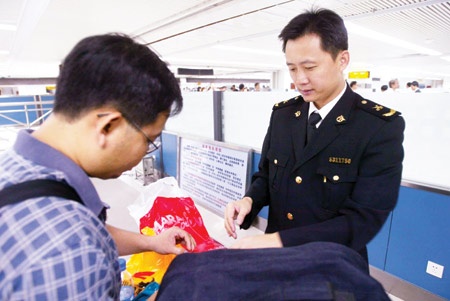Authorities step up their crackdown on smuggling
Anyone who frequently uses the Sheung Shui metro station in Hong Kong, which borders Shenzhen in Guangdong Province, will probably notice a large group of mostly elderly people or young women standing around large boxes during most times of the day.
Look inside these boxes and you will see various luxury products, ranging from wines and digital cameras to Gucci bags. They also contain goods that one might think twice about buying on the mainland, such as milk powder.
These people are part of a smuggling chain who will help you move the boxes across the border for a fee. HK$10 ($1.2) will get you a can of milk powder, and HK$15 ($1.9) a bag of clothes, China Central Television reported recently.
Some of them cross the border up to 50 times a day, according to the General Administration of Customs, which has recently stepped up its crackdown on the practice, drawing accusations that it has violated World Trade Organization rules.
The CCTV report said Shenzhen customs authorities have cracked down on 33 smugglers and seized 20,000 carats of diamonds worth 166 million yuan ($24 million).
"They are smugglers who disguise themselves as normal travelers, and deliver products secretly from Hong Kong to the mainland," a customs officer said in the report.
The administration said there are about 8,000 such smugglers currently operating. Some are Hong Kong residents traveling on home-return permits, others are mainlanders entering Hong Kong on travel permits.
The products they smuggle are worth billions of yuan, depriving the State of millions in tax revenue.
Worth the trip
The administration launched a campaign against smuggling in Shenzhen and Gongbei in September. In the first month alone, it uncovered 939 cases, seizing goods worth 49.88 million yuan ($7.48 million) that would have brought in 5.01 million yuan ($751,462) in tax.
The reason behind the popularity of this activity lies in the price differences between products in Hong Kong and the mainland.
While mainlanders generally earn less than Hong Kong residents, many luxury products on the mainland are more expensive due to higher import tariffs.
For example, a Nokia mobile phone sold for HK$1,700 ($219) in Hong Kong goes for 2,200 yuan ($330) on the mainland, CCTV report said.
A 13-inch 128-gigabyte MacBook Air costs 10,498 yuan ($1,575) on the mainland, but only HK$9,888 ($1,274) in Hong Kong.
"It is the most natural thing for people to seek profits when the difference is so big," Zheng Jianmin, a professor at the University of International Business and Economics, told the Global Times.
The Ministry of Commerce had earlier accused customs officials of violating World Trade Organization rules by imposing a 20 percent levy on electronic products, including iPads, brought by individuals into the Chinese mainland, even those meant for personal use. However, the ministry later said it would support customs authorities in carrying out its legitimate duties.
 0
0 








Go to Forum >>0 Comments